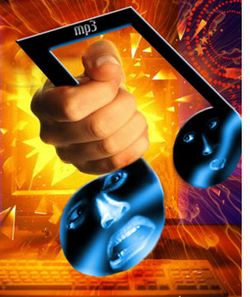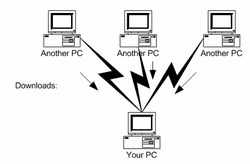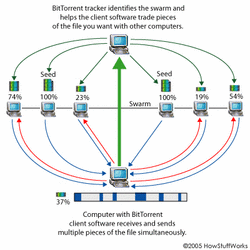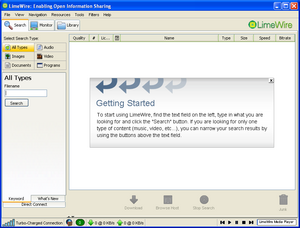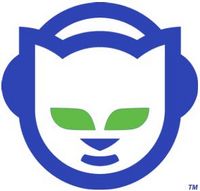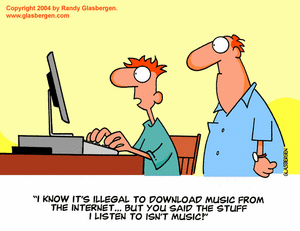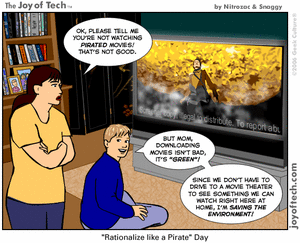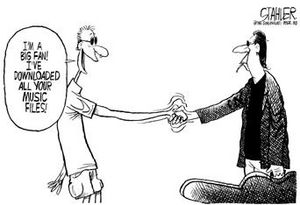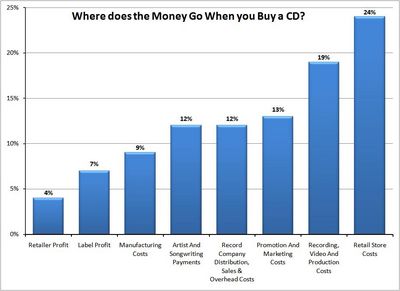Illegal Media Sharing
Contents
- 1 Group Name
- 2 Group Members
- 3 Group Topic
- 4 Initial Project Statement
- 5 Definitions
- 6 What is Illegal Media Sharing?
- 7 How does Illegal Media Sharing Occur?
- 8 Who Does Illegal Media Sharing and Why?
- 9 Who is Affected by Illegal Media Sharing?
- 10 Where does the Money Go When you Buy a CD?
- 11 What is Being Done about Illegal Media Sharing?
- 12 What are the Legal Consequences of Illegal Media Sharing?
- 13 Conclusion
- 14 References
Group Name
- Legal CrOoKs
Group Members
- Benson Chuong, Faryn Hill, Laura Neumann, Daniel Piekarski, Torrie Wheat
Group Topic
Illegal Media Sharing
- Piracy of Music and Movies Through P2P Networks.
- Programs Associated with P2P Networks include:
- Limewire - file sharing
- Bitorrent - shared package downloading
- Programs Associated with P2P Networks include:
Initial Project Statement
Through researching many viewpoints, we aim to explain what illegal media sharing is, who does it, who it affects, and what is being done about the issue. Specifically, we will explore the legality and consequences of personal music and video sharing through P2P networks.
Definitions
- Botlegging - Something, such as a recording, made, reproduced, or sold illegally or without authorization.
- Counterfeiting - To make a copy of, usually with the intent to defraud; to forge.
- Illegal - Forbidden by law or statute.
- Media - In computer science, an object or device on which data is stored (file).
- Sharing - To allow someone to use or enjoy something that one possesses.
- MP3 - The file extenstion for MPEG Audio layer-3; a set of standards for compressing and downloaing audio files from the internet.
- Peer to Peer - Allows internet users to transfer files directly from one user computer to another, rather than through the use of a website or directory.
- Piracy - The unauthorized reproduction or use of a copyrighted book, recording, television program, patented invention, trademarked product, etc.
- BitTorrent - A peer-to-peer (P2P) communications protocol for file sharing. However, it differs from other P2P software programs in that all downloaders are automatically uploaders.
- Gnutella - A software application used to exchange files between people over the internet.
What is Illegal Media Sharing?
Illegal Media Sharing is the process of taking copyrighted material and distributing it to others without prior written permission of the copyright holder. Those who download the distributed files are also performing an illegal action. The internet is the main source of this issue since it allows easy access for people to almost any music, movie, or software file they desire. Even though this is illegal, consequences and penalties are not consistently enforced so people see the law as no big deal and continue to break it.
How does Illegal Media Sharing Occur?
Sharing of files can be acheived in many different ways. A few methods that we will cover include:
- Peer-2-Peer (P2P)
- BitTorrent
- LimeWire
- Napster
- Internet Downloading
Although the process of sharing files is not illegal, the type of files shared may violate certain laws. For example, if you compose a song and share it over the internet, this is not considered illegal. But, if you take a song composed by someone else and share it, this is illegal.
Peer-to-Peer (P2P)
This technology was developed as a convenient method to share files and is currently the most common form of file sharing across the Internet. P2P is based on the requirement that someone makes files on his or her computer available for other people to access and download. The files are not stored on the internet, but directly transferred between personal computers. As the sharing process expands, more and more copies of the files are distributed among the network and download speed will gradually increase.
Examples of programs that use P2P Technology include: LimeWire and BitTorrent. We should note that the use of P2P sharing program is not illegal and most programs can be freely downloaded off the internet. Many program developers have included information about sharing of "illegal" files part of their End-User Licence Agreements.
BitTorrent
BitTorrent, another free P2P sharing system, was released in the Summer of 2001 and was developed by Bram Cohen. BitTorrent is used more often in larger file sharing including pirated movies and full music albums. There was an estimate made in 2004 that placed BitTorrent downloading 3rd among all internet traffic. BitTorrent was designed to encourage a more efficient way of file sharing. The feature that accomplishes this is that each downloader is inevitably an uploader. Because of the way the system is designed it provides faster and more efficient downloads for users. Since BitTorrent has managed to enable and maintain transfer of files requiring relatively high-bandwidth, higher quality files are evident compared to competing P2P software. Similarly to other P2P sharing software, BitTorrent respects copyright laws and expects its users do the same.
LimeWire
LimeWire is a type of peer-to-peer sharing client designed in the Java programming language. The company was founded in 2000 under the name Lime Wire LLC. LimeWire was considered to be a step up from the previously popular Napster. In early 2001, Napster was ordered in court to eliminate file sharing of most copywritten material and since then has been losing users. Because of this, LimeWire gained a lot of support and downloads from people who were searching for an alternative to continue building up their media libraries for free over the internet. Through LimeWire people are allowed to share files ranging anywhere from music to movies to software using the Gnutella network system. LimeWire offers their software to users for free from their website, but also advertises for LimeWire PRO. This enhanced version of LimeWire promotes faster downloads, free technical support and other optimized features for the price of 3 music CD’s each year. Since early 2005, the LimeWire free download has been activated over hundreds of millions of times. As it stands, LimeWire is legal software, but using it to share copyrighted files remains illegal where those laws apply. LimeWire does support owners of copywritten material by blocking the sharing of whatever files the owner has requested.
Napster (prior to 2002)
Napster was one of the original services that provided users direct connection to various media downloads through P2P sharing. It is considered that Napster provided the backbone for the more recent P2P sharing clients. There was much controversy about what Napster’s services provided. Generally, independent music artists who had no real promotion besides Napster supported them. They argued that Napster allowed their music to be spread and that in the long run improved overall record sales. The opposite of the spectrum also existed, usually among more recognized artists. They claimed Napster had been spreading their work to people for free without consent. After many lawsuits against Napster for sharing copyrighted materials, Napster attempted to control the contents of what was shared by users. After failing to do this, Napster shut down in 2001 and claimed bankruptcy in 2002. Currently Napster is set up to distribute Legal Music and Videos through their paid for subscription service.
Internet Downloading
This is the simplest way to share files on the internet. A file is uploaded to a central server, where it is made readily available to everyone on the internet. Access to the file can be restricted by requiring the end user to log in. This form of sharing is less common because transfer speed can be slow and files are seldom removed from the servers after a period of time. This causes errors and difficulties when downloading the files. Once again the sharing of files can be illegal or non-illegal depending on the way the file was attained.
Who Does Illegal Media Sharing and Why?
In Canada, most of the illegal media sharing is done by youth. Canadians between 12 and 24 years of age are responsible for 78 per cent of illegal music downloading, even though they make up just 21 per cent of the population, says Pollara. The Pollara polling agency also found that 12 to 17 year olds are the most likely to strongly agree that "artists are too rich already so downloading won't hurt them." Another study was done by Environics, and they found:
- 60 per cent of Canadians aged 18-29 are willing to download music from the Internet without paying for it, compared with 29 per cent of the general population.
- Half of young people believe it's all right to illegally download music because others do it too.
Another nationwide opinion poll asked more than 1,100 8 to 18 year olds about their attitudes toward copyright law and Internet behavior, including sharing copyrighted files through online P2P sites. The reasons they cited for illegally downloading material:
- I do not have money to pay for software (51%)
- I wouldn`t use the software if I had to pay for it (35%)
- Lots of people do it (33%)
- It doesn`t hurt anybody when I do this (26%)
- No one has ever told me not to (19%)
- I won`t get in trouble for doing it (15%)
- My parents have said it is okay (8%)
Who is Affected by Illegal Media Sharing?
Basically anything that can be downloaded onto a computer can be passed through file sharing networks. The movie, television and music industry are the most obviously affected by illegal media sharing and it's not just in North America that illegal media sharing is a major issue. The International Federation of the Phonographic Industries (IFPI), which represents the record industry globally, stated that the British music industry lost 414 million pounds last year in illegal downloading and sharing. The IFPI also stated over the last three years illegal piracy has cost the UK music industry over 1.1 billion pounds and is close to making Portugal's music industry disappear unless stringent and policy measures are established.
In a 2007 sample survey of users of P2P sharing software in Italy, 61% admitted to buying less than 1 music CD a month and more then 30% of this group have stopped buying music albums completely. This loss of sales in genuine CD's translates into millions of dollars. Therefore, a direct relationship to the number of CD's sold and the existence of free file sharing is evident in this case.
However, researchers at Harvard University and the University of North Carolina completed a study in which they tracked music downloads over 17 weeks in 2002 and matched data on file transfers with actual market performance of the songs and albums being downloaded. They found that "file sharing has only had a limited effect on record sales. While downloads occur on a vast scale, most users are likely individuals who would not have bought the album even in the absence of file sharing." Big record labels have seen their sales slide and have blamed it on free music downloads online available through illegal media sharing. Other factors, such as lower household spending and increased competition from other entertainment such as DVDs and video games, seem to have had a larger impact.
Where does the Money Go When you Buy a CD?
Canadian Recording Industry Association compiled figures:
- 4% is retailer profit
- 7% is label profit
- 9% is manufacturing costs
- 12% is artist and songwriting payments
- 12% is record company distribution, sales & overhead costs
- 13% is promotion and marketing costs
- 19% is recording, video and production costs
- 24% is retail store costs
What is Being Done about Illegal Media Sharing?
In 2000, Napster was sued by many different claims. It all started when Metallica realized that one of their unreleased albums had been circulating through the internet community via the Napster file sharing system. This resulted in the unreleased songs to be played on radios across the US. Shortly after that, rapper Dr. Dre filed another lawsuit against Napster for failing to remove his music from their sharing library as he requested. Also in 2000, A&M records along with other recording companies filed lawsuits against Napster for allowing it’s users to have direct access to copyrighted material. In the end, Napster was allowed to run but monitor and block all infringing material. They were unable to do this and in July 2001 it was the demise of the Napster system.
The Recording Industry Association of America (RIAA) began a new initiative plan on February 28, 2007. The ultimate goal of this new program was to crackdown on college students in the USA who downloaded illegally. Over 400 letters to 13 different Universities were sent by the RIAA. These letters stated that the students who had been officially caught for downloading illegally could avoid the proposed lawsuits by deleting the infringing content off their computers. Specialists would then take a look at the computers to ensure the files had been properly deleted. Otherwise the students would be faced with the lawsuits that were aligned. Since the Napster controversy in 2000, the RIAA continues their efforts to halt illegal media downloading.
What are the Legal Consequences of Illegal Media Sharing?
Considering all of the media, celebrity hype and intense focus on the issue of illegal media downloading and file sharing, the consequences for taking part in the deed seem rather minor. Canada itself has no official law against illegal media downloading at all. The United States have incorporated a law, but to this day, no one has been convicted of anything, even with thousands of lawsuits in the last 5 years. Lawsuits are the only way that record labels and huge movie companies can get any compensation. In Canada, no lawsuits have been filed because we have no infringement laws that are applicable. In the United States however, thousands of lawsuits have been issued to the American people, most of them from the RIAA.
Canada
In Canada, we have no official law that we can break in the topic of file sharing. In fact, when a proposed change to the laws came to the House or Commons in 2004, it was shot down 9 to 0. Some of the changes that were proposed in that bill included:
- Make it illegal to put copyrighted material into shared directories or file sharing systems
- These would include programs like Kazaa or Bit torrent:
- Make it illegal to bypass copy-protection mechanisms on copyrighted material
- This would make it illegal to download a CD that you bought and transfer the music into your computer, and later onto a MP3 device for your own personal use
- Make it illegal to put copyrighted material into shared directories or file sharing systems
Currently, in Canada, downloading a song for personal use and placing a song in an online music sharing directory is not considered distribution and is not illegal. The CRIA has tried to identify and convict many people for posted songs in file sharing directories, however, because of the above stated facts; they cannot sue or convict anyone.
USA
The United States has few laws implemented to prosecute file sharers. However, they are steps ahead of Canada, as they are in the infancy stage of making applicable laws. In the mean time, there have been thousands of lawsuits by the RIAA over the past four years. The RIAA has won some, lost some and settled out of court a lot. They claim they are suing Americans, ranging form 12 years of age to 60 years of age, to discourage others from downloading and sharing copyrighted music.
Between 2003 and 2007, there have been over 30,000 suits by the RIAA in the United States against alleged file sharers. The majority of these cases were settled out of court, with the accused usually paying a fine. However, some of the suits have gone to trial. An example of a suit that the RIAA won was in 2007. An American women was allegedly caught sharing 24 pirated songs from her computer. Her verdict came to be $220,000.00. The retail price of the songs she shared were only about $24.00.
In the United States, there are two copy right infringements a person can make: primary and secondary infringement. Primary infringement is when a person admits to downloading copyrighted files and making them available to share. These types are cases are very rare because there is no evidence that people knowingly make files available to share on purpose. Unless they state that they knowingly did downloading copyrighted files, cases like this usually are dismissed. Secondary infringement is when a person does not download copyrighted music themselves, but encourages and induces others. Most cases that involve secondary infringement involve P2P networks. Because these networks make available technology to download copyrighted music publicly, they are accused of inducing infringement. An example of a case like this is when the RIAA shut down Napster in the beginning years of the file sharing era.
As one can see, there are major differences between the American and Canadian laws against file sharing. There is little talk in Canada of making any such laws in the future, thanks to our minority government. In the United States there is, at the very least, some talks about making copyright laws stronger and more up to date for the internet and file sharing age.
Conclusion
Ultimately, the choice is yours whether or not you choose to upload, download, or share music and videos that you did not create. It is important to remember who is affected by your actions and what the consequences will be if you are caught performing an illegal action.
We believe that when you purchase something it makes it yours, so a copyright certificate should be transferred to the new owner. So, as long as the party who is sharing is not profiting, then yes, media sharing it should be legal.
References
Benson
- A $22-billion problem -- http://www.nationalpost.com/opinion/story.html?id=278477
- Spain tops illegal downloads -- http://www.hollywoodreporter.com/hr/content_display/international/news/e3icc3ecff90499bc8c82790ff2b7f4106b
- MPAA backtracks on file sharing claims -- http://daily.stanford.edu/article/2008/2/1/mpaaBacktracksOnFileSharingClaims
- A Lower Software Piracy Rate In Canada Would Yield $2.7 Billion In Economic Growth Over Four Years -- http://www.newswire.ca/en/releases/archive/January2008/22/c2821.html
- Piracy sinking PC games industry -- http://www.canada.com/topics/technology/games/story.html?id=ae936f84-8def-457d-b07a-40099252278d&k=25113
Music and Limewire
- Q: Is downloading songs from Limewire illegal or legal? -- http://wiki.answers.com/Q/Is_downloading_songs_from_Limewire_illegal_or_legal
- Illegal Downloading Hurting Music Sales -- http://www.ilounge.com/index.php/news/comments/illegal-downloading-hurting-music-sales/
- Canada avoids iPod tax again -- http://www.techspot.com/news/28564-canada-avoids-ipod-tax-again.html
- Stanford to hit P2P users in the wallet with reconnection fees -- http://arstechnica.com/news.ars/post/20070516-stanford-to-hit-p2p-users-in-the-wallet-with-reconnection-fees.html
Movies and BitTorrent
- Director John August Clairifies the Bright Side of Illegal Torrent Downloads -- http://www.slashfilm.com/2008/01/27/director-john-august-clairifies-the-bright-side-of-illegal-torrent-downloads/
- Pirate Bay Says It Can't Be Sunk, Servers Scattered Worldwide -- http://blog.wired.com/27bstroke6/2008/02/the-pirate-bay.html
- Secrets of the Pirate Bay -- http://www.wired.com/science/discoveries/news/2006/08/71543?currentPage=all
- Analysis: How ISPs Can Solve the BitTorrent Problem -- http://www.extremetech.com/print_article2/0,1217,a=224098,00.asp
- BitTorrent traffic is no different from email traffic -- http://www.geekzone.co.nz/freitasm/4479
- Video piracy is here to stay: viewers; Police say 'piracy for personal use' is no longer being targeted -- http://www.standard-freeholder.com/ArticleDisplay.aspx?e=881792
- Man charged for allegedly taping movie at theatre -- http://www.ctv.ca/servlet/ArticleNews/story/CTVNews/20080117/movie_recording_080117/20080117?hub=TopStories
- IsoHunt heads to Canada after ISP shutdown -- http://www.techspot.com/news/24117-isohunt-heads-to-canada-after-isp-shutdown.html
- TorrentSpy, isoHunt to filter copyrighted content -- http://www.techspot.com/news/25859-torrentspy-isohunt-to-filter-copyrighted-content.html
Faryn
- Artist opinions and quote on illegal downloading -- http://www.musicunited.org/3_artists.html
- Government targets college campuses for illegal donwloading -- http://media.www.newsteamboulder.com/media/storage/paper1155/news/2007/11/15/News/Laws-On.Illegal.Media.Downloading.Target.Campuses-3104634.shtml
- The Recording Industry Association of America website with their opions and laws on illegal downloading of music --http://www.riaa.com/physicalpiracy.php?content_selector=piracy_online_the_law
- CBC News article and facts about music downloading -- http://www.cbc.ca/news/background/internet/downloading_music.html
- 12 year old girl is sued in new york -- http://www.foxnews.com/story/0,2933,96797,00.html
- Deffintions --- http://dictionary.reference.com
- Mtv leaks entire albums before release dates to increase awareness -- http://www.mtv.ca/theleak/home.jhtml
- CRIA and what they think about file sharing --http://www.cria.ca/filesharing.php
- Article about canadian government taking no legal action -- http://www.cria.ca/news/141207_n.php
- Definitions of piracy -- http://www.cria.ca/antipiracy.php
Laura
- Argument for copyright rights -- http://www.cnn.com/2003/LAW/08/07/findlaw.analysis.hamilton.music/index.html
- Recent history of music downloading -- http://www.cbc.ca/news/background/internet/downloading_music.html
- What is illegal music downloading -- http://www.legal-musicdownloads.org/illegal-music-downloading.html
- Who downloads illegally -- http://www.ctv.ca/servlet/ArticleNews/story/CTVNews/20050929/downloading_050929/20050929/
- Study says illegal downloading does NOT significantly affect CD sales -- http://www.news.com/2100-1027_3-5181562.html
- U2 manager wants action -- http://www.telegraph.co.uk/connected/main.jhtml?xml=/connected/2008/01/29/dlutwo129.xml
- Illegal downloading winning 20 to 1 -- http://www.bloggingstocks.com/2008/01/28/illegal-music-downloading-outpacing-legal-by-20-to-1/
- Music industry gives away tunes -- Music_industry_gives_away_tunes
- A musician's take on illegal downloading -- http://www.associatedcontent.com/article/61619/illegal_downloading_why_i_do_it.html
- Illegal downloading brings in viruses -- http://collegian.csufresno.edu/2007/10/26/is-downloading-getting-you-down/
- Fear of viruses/spyware-- http://www.scmagazineus.com/Fear-of-viruses-spyware-cut-down-illegal-downloads/article/33327/
- Downloading costly if caught -- http://media.www.kentnewsnet.com/media/storage/paper867/news/2005/10/10/News/Illegal.Downloading.Can.Cost.More.In.The.End-1518228.shtml
- Teens' reasons for downloading illegally -- http://www.internetretailer.com/internet/marketing-conference/59203-technology-not-ethics-worry-teens-about-illegal-downloading-study-says.html
Daniel
- General information and supporting sites of legal music downlaoding -- http://www.whatsthedownload.com/
- Illegal downloading and the long tail -- http://www.theseminal.com/2007/07/03/illegal-downloading-and-the-long-tail/
- Illegal media downloading declines in 2003 -- http://www.techweb.com/wire/26803753
- Stat - Illegal downloading on the rise -- http://www.nme.com/news/nme/30021
- Illegal music downloading at an all time high -- http://mashable.com/2007/07/31/illegal-music-downloads-high
- Downloading Pirated Anything is Not Illegal -- http://www.untwistedvortex.com/2007/03/20/downloading-pirated-anything-is-not-illegal/
- Stats - How llegal file sharing impacts the music industry in Italy -- http://www.ifpi.org/content/section_news/20070524.html
- Anti-Piracy Gang Launches their own Video Download Site to Trap People? -- http://torrentfreak.com/anti-piracy-gang-launches-their-own-video-download-site-to-trap-people/
- What’s the big deal? -- http://www.brown.edu/Facilities/CIS/itsecurity/keepitsafe/copyright1_07.html
- RIAA warns students about illegal downloading -- http://www.afterdawn.com/news/archive/8816.cfm
- Campuses crackdown on illegal downloading -- http://media.www.fairfieldmirror.com/media/storage/paper148/news/2007/04/12/News/Campuses.Crack.Down.On.Illegal.Downloading-2834520.shtml
- Americans don’t think illegal downloading is a serious offense -- http://www.afterdawn.com/news/archive/8493.cfm
- Napster being replaced by LimeWire for P2P sharing -- http://www.avrev.com/news/0401/13.limewire.shtml
Torrie
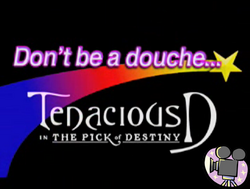
- Download uproar.. Record industry goes after personal use. -- http://www.washingtonpost.com/wp-dyn/content/article/2007/12/28/AR2007122800693.html
- Illegal download trackers. -- http://bigblog.com/online_legal_issues/illegal-download-tracker-used-by-fast-1280843603.html <-- Bensonchuong This is a search result page, don't think there is much here'
- When is Downloading on the internet Illegal?! -- http://www.webopedia.com/DidYouKnow/Internet/2004/music_downloading.asp
- MUSIC LAW.. this ones pretty good! -- http://www.heydary.com/publications/music-laws.html
- Heres a video clip. This ones of Jack Black saying "Don't be a douch." -- http://www.youtube.com/watch?v=-LkWKvMCzqA <-- Bensonchuong Put up the video for you.
- Video clip.. Paul McCartney saying he would have downloaded music back in the day if he could have. -- http://www.youtube.com/watch?v=IAOrKQyp0WU
- Video clip.. Funny stuff, not sure if Mishtu would be to fond of it. -- http://www.youtube.com/watch?v=281e8Wy71o0
- Congress address Illegal Media Downloads. -- http://media.www.dailytrojan.com/media/storage/paper679/news/2008/02/15/News/Congress.Addresses.Illegal.Media.Downloads-3213302.shtml
- Illegal downloads hit record highs.. -- http://www.telegraph.co.uk/money/main.jhtml?xml=/money/2007/07/30/bcnmusic130.xml
- Internet users could be banned over illegal downloading. -- http://technology.timesonline.co.uk/tol/news/tech_and_web/the_web/article3353387.ece

